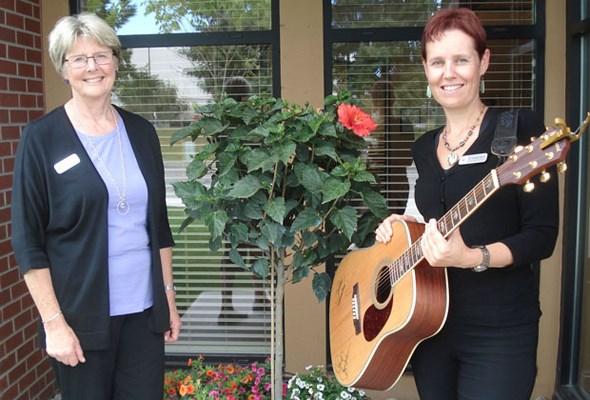Music and art can be invaluable tools for those on the road to healing.
The Delta Hospice Society's centre for supportive care has been able to expand a couple of counselling options involving music and arts thanks to the arrival earlier this year of Dr. Heather Mohan, who has extensive experience facilitating support groups and counselling services for children, youth and parents.
For the past 13 years Mohan worked as the coordinator of the Family Bereavement Program and Arts Therapy Services for the North Shore Hospice/ Palliative Care Program.
Founding Canada's first family bereavement retreat program in 2007 called Camp Kerry, she has an approach to counselling that's holistic, family-centered and arts-based. She specializes in working with children who have suffered the loss of a loved one.
Executive director Nancy Macey says the Delta Hospice Society wanted to expand its services for youth.
Mohan is starting a children's grief group for kids five to 12 who are grieving the death of a parent, sibling, grandparent or other significant person. A similar group for parents will be held at the same time, starting Oct. 18.
Mohan is also involved with an expressive arts counselling program for youth and adults, already in place but expanding.
"It's really just about using different ways of expressing yourself, using music or art or creating things with clay. Sometimes kids bring in their own music to listen to while they're in the art/play room, or sometimes we might write songs or poetry.
There's kind of no limit. It's about using different mediums to reach the same goals," she explains.
"Most of the kids we see are teenagers who are here because they've had a death in the family. So it would be about helping them to make sense of that loss and express their feelings about that loss, and to work towards a healing process through expression and connection."
Mohan says unlike a school, which is teacher structured, the art or music by the youth at the centre is directed by the members, while she'll initiate a conversation around what they're doing as it's appropriate.
Macey says music/arts therapy helps young people learn healthy coping strategies, instead of steering toward more destructive ones like drugs or alcohol.
"I know with my experience, when I lost my brother when he drowned in a swimming pool, my experience was he was never mentioned. Pictures were put away, it was never talked about with any of us. It just gets stuffed down and it's not healthy. So what Heather offers allows people to process that grief," says Macey.
Mohan, who's also a registered music therapist, uses live music to help adults, including those living out their remaining days at the palliative care residence.
"That's a different process, but it still falls under that umbrella of using creative arts as tools for healing," she says.
"Music can work in different ways. Obviously when someone's really sick, they don't have the energy to make music, so what they're doing is receiving music. The important thing that a music therapist does is assess the situation in terms of what are the preferences and what's needed in that situation.
"There was a situation a while ago when a family was having a vigil. (The patient) was very peaceful, very comfortable, but the family was very welcoming music and the patient had always loved music, so they asked if I could come and play (the guitar) while they hold her. She died in the middle of a song while her family members were talking to her and kind of echoing the lyrics of the songs."
Mohan says another patient wanted help in writing a song about his life.
Another recent example of how music can help in the bereavement process was in a adult group session, where participants were asked to share a piece of music that was important to their loved ones.
Macey says one normally doesn't associate healing with someone dying, but there's a lot of healing that can take place during that process and the goal is to create a healing environment.
The Delta Hospice Society care centre and the resident care building in Ladner opened last year.
An $8.5 million project, the Harold and Veronica Savage Centre for Supportive Care and Irene Thomas Hospice, at 4631 Clarence Taylor Cres., adjacent to Delta Hospital, were built entirely thanks to the donations.
Fraser Health provided the land and operating dollars are provided for the 10-bed palliative care unit, but it's still up to the society to fund the operations of supportive care centre, which provides information, counselling and acts as an all-round resource base for families.
For more information about hospice services, call 604-948-0662 or visit www. deltahospice.org.



